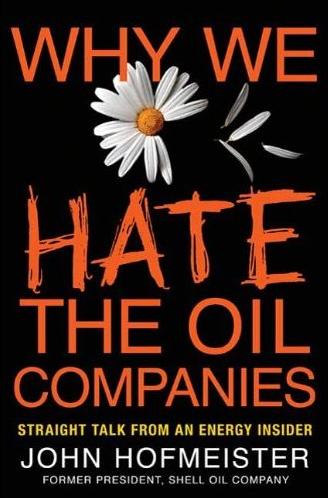Book Review: “Why We Hate the Oil Companies” by John Hofmeister
 A very recent shooting star in the newstalk world has been John Hofmeister, former GE manager under legendary GE Chairman Jack Welch (author of Winning and others), and before he retired, President of Shell Oil Company. He has written a book subtitled “straight talk from an energy insider”.
A very recent shooting star in the newstalk world has been John Hofmeister, former GE manager under legendary GE Chairman Jack Welch (author of Winning and others), and before he retired, President of Shell Oil Company. He has written a book subtitled “straight talk from an energy insider”.
An insider he certainly is, but the messages in the book are anything but straight talk.
It is certainly an interesting read, but the book’s messages are both internally contradictory and not particularly unknown, at least to those in the energy industry.
Hofmeister seems to try and have feet firmly planted on both sides of the fence. He promotes alternative energy schemes yet rightly observes that we are stuck with hydrocarbon fuels—like them or not—for the foreseeable future.
An admitted original “Earth Day” proponent, he says oil, gas, and coal are our only real choices today. Nuclear energy should be used, but of course points out (in part due to the Earth Day crowd’s efforts) that we have not built a nuclear power plant in decades and are unlikely to do so under this administration.
He is a proponent of most green initiatives, but recognizes that corn ethanol is not a good choice, and dislikes the massive subsidies to wind and solar. He is honest about many downsides of green energy, though he does not get into the “life cycle” costs such as massive pollution in China at the solar and wind manufacturing facilities. He is also effective in debunking the notion that we are rapidly running out of oil, in essence saying we will never run out as hydrocarbon technology improves and other power sources (green or otherwise) are developed. He likes natural gas and cleaner coal technologies.
The book is certainly not without value. His insights into both electric generation and transportation uses of fuel sources—two completely different markets with different short and long term problems—are excellent. It is a very readable book that a serious reader can finish in a long night or two. There is a very interesting chapter on the distinctions between what Hofmeister calls “energy time” (long years to find and develop new energy reservoirs, sources, and technologies) and “political time” (driven entirely by the next election cycle, starting almost immediately after the prior election.)
TexasGOPVote.com readers may be particularly interested in his chapters and other embedded anecdotes regarding his frequent visits to Washington, D.C., where one surmises he is more of a political “insider” than in the oil business. He is quite candid about conversations he experienced with various legislators of both parties. (The infamous “socialism” comment by Rep. Maxine Waters (D-CA) was directed at Mr. Hofmeister during a Congressional dog-and-pony show beating up oil companies—a door-opening opportunity he could have used to do battle with the Marxists that he failed to walk through.)
In a chapter that seems strangely out of place, he promotes massive government land use planning and restrictions--essentially forcing people to live and work in cities and use mass transportation schemes that he thinks are more energy efficient. This fits more with 1960s “no growth” mantras out of Northern California and Colorado than it does in this book.
There is no mention of the BP Macondo well (which happened after it was written but before publishing) or any serious or explicit discussion answering exactly “why we hate the oil companies.” However, a thread throughout the book shows how the oil companies tend to focus so strongly on finding and producing oil and gas, usually on timescales that transcend administrations and world news events, that they have neglected the public relations aspect more than having committed any unpardonable sin. Nor does he give much attention to Saudi (and hence OPEC) price fixing strategies, which have been immensely successful (from the Saudi government point of view) in maximizing oil prices and OPEC profits while not triggering significant competition (hydrocarbon or otherwise) for four decades now, starting under the leadership of then Saudi oil minister Sheik Yamani in the 1970s.
Hofmeister is consistent on one item throughout the book, however. Quite simply, it is largely the government that has caused our energy related trials and tribulations, and in a greater sense, that the government is inherently inefficient, not focused on solutions, and at this point, likely incapable of ever producing any meaningful energy policy. Only a relatively unified public can snatch victory from government at this point.
Overall, a good read that stretches your thoughts at times, but still gets a B+. Time would be better spent reading Adam Smith’s The Wealth of Nations, Ayn Rand’s Atlas Shrugged, Jack Welch’s Winning, or if you want something on oil in particular, the book The Prize by Daniel Yergin.




Comments
Facebook Comments
Make sure to check out the comments on Facebook.